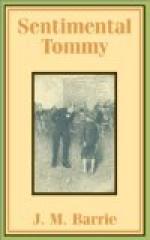more than mortal—well, the air is filled
with music. It seems to come from but a few yards
away, and pressing his hand to his throbbing brow
the Chevalier presses forward till, pushing aside
the branches of a fallen fir, he comes suddenly upon
a scene of such romantic beauty that he stands rooted
to the ground. Before him, softly lit by a half-moon
(the man in it perspiring with curiosity), is a miniature
dell, behind which rise threatening rocks, overgrown
here and there by grass, heath, and bracken, while
in the centre of the dell is a bubbling spring called
the Cuttle Well, whose water, as it overflows a natural
basin, soaks into the surrounding ground and so finds
a way into the picturesque stream below. But
it is not the loveliness of the spot which fascinates
the prince; rather is it the exquisite creature who
sits by the bubbling spring, a reed from a hand-loom
in her hands, from which she strikes mournful sounds,
the while she raises her voice in song. A pink
scarf and a blue ribbon are crossed upon her breast,
her dark tresses kiss her lovely neck, and as she
sits on the only dry stone, her face raised as if
in wrapt communion with the heavens, and her feet
tucked beneath her to avoid the mud, she seems not
a human being, but the very spirit of the place and
hour. The royal wanderer remains spellbound,
while she strikes her lyre and sings (with but one
trivial alteration) the song of MacMurrough:—
Awake on your hills, on your islands awake,
Brave sons of the mountains, the frith and the lake!
’Tis the bugle—but not for the chase
is the call;
’Tis the pibroch’s shrill summons—but
not to the hall.
’Tis the summons of heroes for conquest or death,
When the banners are blazing on mountain and heath;
They call to the dirk, the claymore and the targe,
To the march and the muster, the line and the charge.
Be the brand of each Chieftain like Stroke’s
in his ire!
May the blood through his veins flow like currents
of fire!
Burst the base foreign yoke as your sires did of yore,
Or die like your sires, and endure it no more.
As the fair singer concluded, Stroke, who had been
deeply moved, heaved a great sigh, and immediately,
as if in echo of it, came a sigh from the opposite
side of the dell. In a second of time three people
had learned that a certain lady had two lovers.
She starts to her feet, still carefully avoiding the
puddles, but it is not she who speaks.
("Did you hear me?”)
("Ay.”)
("You’re ready?”)
("Ca’ awa’.”)
Stroke dashes to the girl’s side, just in time
to pluck her from the arms of a masked man. The
villain raises his mask and reveals the face of—it
looks like Corp, but the disguise is thrown away on
Stroke.
“Ha, Cathro,” he exclaims joyfully, “so
at last we meet on equal terms!”
“Back, Stroke, and let me pass.”
“Nay, we fight for the wench.”




